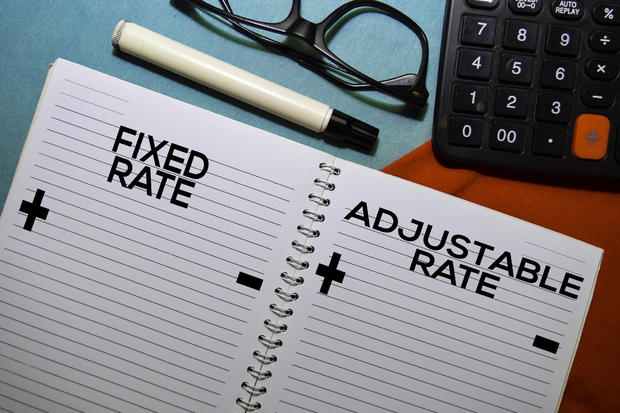Adjustable-rate vs. fixed-rate mortgages: Which is better?
Buying a house is one of the biggest financial decisions you'll make in your life. Besides finding the ideal home, selecting the right mortgage is crucial, because it can make or break your budget.
There are several mortgage options available, with the two most common being adjustable-rate mortgages (ARMs) and fixed-rate mortgages. Both have their pros and cons, but your decision ultimately boils down to your financial goals and future plans.
Begin exploring your mortgage options online now.
Adjustable-rate vs. fixed-rate mortgages: Which is better?
To determine the best type of mortgage for you, it's important to first understand how each one works.
Fixed-rate mortgages
A fixed-rate mortgage may be the most well-known type of mortgage. As the name suggests, the interest rate you lock in upon approval stays fixed over the life of your loan. That means your monthly mortgage payments don't change and you'll have payed your loan in full by the end of the term. Fixed-rate mortgages give you predictability and protection from interest rate fluctuations, allowing you to budget appropriately for your monthly payments.
However, fixed mortgage rates are typically higher than the initial rate offered by ARMs. And if interest rates go down, you won't benefit from them (unless you decide to refinance). That said, if interest rates go up, your payment won't increase.
See today's top mortgage rates here.
Adjustable-rate mortgages
Adjustable-rate mortgages, as the name implies, have variable interest rates. They initially have a lower starting interest rate than fixed-rate mortgages, which makes them appealing to buyers on a tight budget today.
This initial rate is fixed for a specific term (typically three, five, seven or 10 years). After that, the rate adjusts every year in accordance with market rates. There's an interest rate cap that limits how much the rate may vary though, to safeguard borrowers from significant rate spikes.
However, because ARM rates are variable, you must budget for the possibility of higher monthly payments in the future. You also may end up paying more over the loan's lifetime, depending on where interest rates go.
Compare current mortgage options online now to find one that's right for you.
Factors to consider when choosing
Some of the factors you should consider when choosing between an adjustable- and fixed-rate mortgage are:
Your financial situation
Since ARM interest rates can be lower initially, your monthly mortgage payments can be more affordable with this type of loan to start. However, once the interest rate starts to adjust, monthly payments can increase significantly, making it difficult to budget from one month to the next. With fixed-rate mortgages, payments stay the same every month throughout the loan's lifetime, with no surprises.
If you expect your income to rise significantly in the future, an ARM's low initial rate may be attractive. If you have a fixed income, a fixed-rate mortgage might be a better choice.
Your risk tolerance
If you're risk-averse and want predictability, a fixed-rate mortgage can give you peace of mind. If you can tolerate some risk to potentially save money in the long run, you may want to consider an ARM. If rates go down in the future, you may end up paying a lot less with an adjustable rate than you otherwise would — but higher interest rates could make your total payment go up.
How long you plan on staying in the home
If you anticipate living in the home for many years (if not decades), a fixed-rate mortgage can protect you from future interest rate hikes. If you plan to stay in your home for only a short period, you may be able to enjoy an ARM's initially low rate before that rate begins adjusting.
Check out mortgages from top lenders online now.
The bottom line
Selecting the right mortgage is critical to protect your financial interests, and whether to opt for an adjustable- or fixed-rate mortgage depends on your unique situation and goals.
Consider the pros and cons of each option and weigh them against the factors listed above to determine which best fits your budget and long-term plans. Don't hesitate to consult a financial professional to ensure you're setting yourself up for a financially healthy life in your new home.




